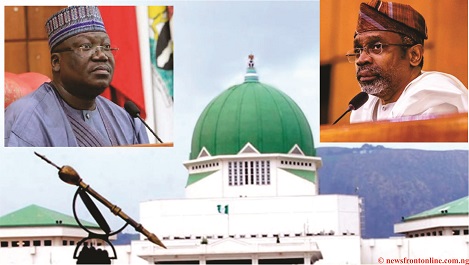… As National Assembly Adopts Devolution Of Powers
OUT of total of 68 bills recommended by the special ad hoc committee on constitution review, only 45 clauses successfully scaled through at both the Senate and House of Representatives.
While members of the House of Representatives voted in support of 56 clauses, the senators voted in support of 47.
Both chambers unanimously rejected the proposals to expand immunity to the legislative and judicial arms of government; provide pension for presiding officers of the National Assembly; provide for diaspora voting; further define Acts that constitute torture, inhuman or degrading treatment and the bill seeking to provide criteria for qualification to become an indigene of a state in Nigeria.
They also rejected the proposals to provide for special seat for women in the national and state houses of assembly; include Value Added Tax on the exclusive legislative list; provide for the procedure of removing presiding officers of the legislature; and the bill to change the name Barkin Ladi Local Government Area.
The outcomes of the voting pattern showed that the Senate and House of Representatives unanimously voted in support of the amendments of the 1999 Constitution which seek to establish local government as a tier of government and guarantee their democratic existence, tenure and abrogation of the state joint local government account and provide for a special account into which shall be paid all allocations due to local government councils from the Federation Account and from the government of the state.
Other proposals unanimously supported by both chambers were those on financial autonomy for state legislature and state judiciary; enforcement of legislative summons; inauguration of senators and members of the House of Representatives; institutionalisation of legislative bureaucracy in the constitution and uniform retirement age and pension rights for judicial officers.
In the same vein, the Senate and House voted in favour of the bills which seek to delete reference in the constitution to the provision of criminal codes; to exclude the period of intervening events in the computation of time for determining pre-election petitions, election petitions and appeals therefrom and bill which seeks to expand the interpretation of judicial office to include courts or tribunals created by an Act of the National Assembly or a state law of the House of Assembly. The lawmakers also voted in support of the bills which seek to provide for the postcall qualification of the secretary of the National Judicial Council; permit public servants to engage in healthcare, education, production and services beyond farming; as well as the bill which seek to impose the requirement of fair hearing in the process of recommendation of removal of judicial officers by the state Judicial Service Commission.
The ongoing advocacy to ensure devolution of powers also gained a boost as the senators and members of the House of Representatives separately passed the bills which seek to move airports; fingerprints, identification and criminal records; prisons (which is to be redesignated as correctional service) and railway from the exclusive legislative list to the concurrent legislative list. In the same vein, both chambers passed the bills which seek to empower the Revenue Mobilisation, Allocation and Fiscal Commission (RMAFC) to enforce compliance with remittance of accruals into and disbursement of revenue from the Federation Account and streamline the procedure for reviewing the revenue allocation formula; enhance the independence of certain bodies; remove transitional lawmaking powers from the executive arms of government.
Similarly, both chambers passed clauses 43 to 55 which seek to specify the time within which the executive shall present to the National Assembly any treaty between the Federation and any other country for enactment; specify the period within which the president or the governor of state shall present the Appropriation Bill before the National Assembly or House of Assembly; require the president or governors to submit the names of persons nominated as ministers or commissioners within 30 days of taking the oaths of office for confirmation by the Senate or state House of Assembly; Third Schedule to the Constitution of the Federal Republic of Nigeria, 1999 to include presiding officers of the National Assembly in the membership of the National Security Council; and establish State Security Council.
Others include bills which seek to empower the National Assembly and state houses of Assembly to summon the president of the Federal Republic of Nigeria and governors of states to answer questions on issues on which the national and state houses of Assembly have the powers to make law; reduce the period within which the president or the governor of a state may authorise the withdrawal of money from the Consolidated Revenue Fund in the absence of an Appropriations Act from six months to three months; establish the Office of the Accountant–General of the Federal Government, separate from the Office of the Accountant–General of the Federation; establish the Office of the Attorney–General of the Federation and of the state separate from the Office of the minister of justice or commissioners for justice of the state, in order to make the offices of the Attorneys–General independent and insulated from partisanship; provide for a state of the nation and state of the state address by the president and governor; replace the Consolidated Revenue Fund of the Federation with the Consolidated Revenue Fund of the Federal Government; specify the timeframe for the conduct of population census and include former heads of the National Assembly in the Council of State.
The lawmakers also supported the bills which seek to enhance existing provisions on the formation of political parties; provide for independent candidacy in presidential, governorship, National Assembly, state houses of assembly and local government council elections; correct the error in the definition of the boundary of the Federal Capital Territory, Abuja; make free, compulsory and basic education a fundamental right of all citizens under Chapter IV of the constitution; require the government to direct its policy towards ensuring rights to food and food security in Nigeria; and reflect the establishment and core functions of the Nigerian Security and Civil Defence Corps.
However, the Senate rejected the bills which seek to provide for the procedure for passing a constitution alteration bill where the president withhold assent; establish the federal revenue court and the revenue court of a state; provide the procedure for overriding executive veto in respect of money bill; further strengthen the judiciary for timely dispensation of justice; provide the timelines within which civil and criminal cases are heard and determined at trial and appellate courts in order to eliminate unnecessary delay in justice administration and delivery; allow court or tribunal proceedings to be conducted remotely, virtually, online or through any media platform or technological innovation; include judges of the National Industrial Court in the composition of election tribunal; provide for the termination of tenure of certain elected officials on account of a change of political party; appointment of mayor for FCT and Minister from the FCT; establish the National and State Councils of Traditional Rulers to advise the president and governors on matters related to customs, security and public order and provide a minimum percentage for women in ministerial or commissioner-nominees.
On its part, the House rejected the bills which seek to expand the scope of citizenship by registration; and provide criteria for qualification to become an indigene of a state in Nigeria.
In his remarks, President of the Senate, Ahmad Lawan, assured that a clean copy of clauses passed by both chambers will be transmitted to state houses of Assembly for further legislative action.
Section 9(2) of the 1999 Constitution (as amended) provides that: “An Act of the National Assembly for the alteration of this Constitution, not being an Act to which Section 8 of this Constitution applies, shall not be passed in either House of the National Assembly unless the proposal is supported by the votes of not less than two-thirds majority of all the members of that House and approved by resolution of the Houses of Assembly of not less than two-thirds of all the states.”
(tribuneonlineng.com excluding headlines)
 Newsfront Online …Telling the Public as it is
Newsfront Online …Telling the Public as it is




